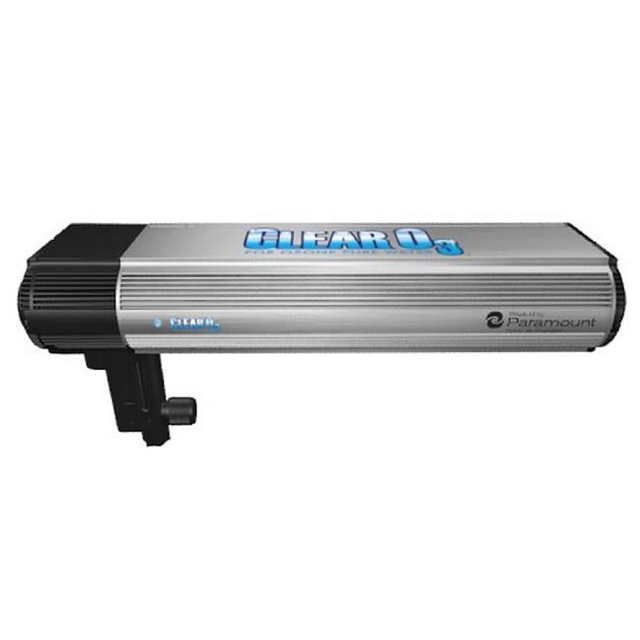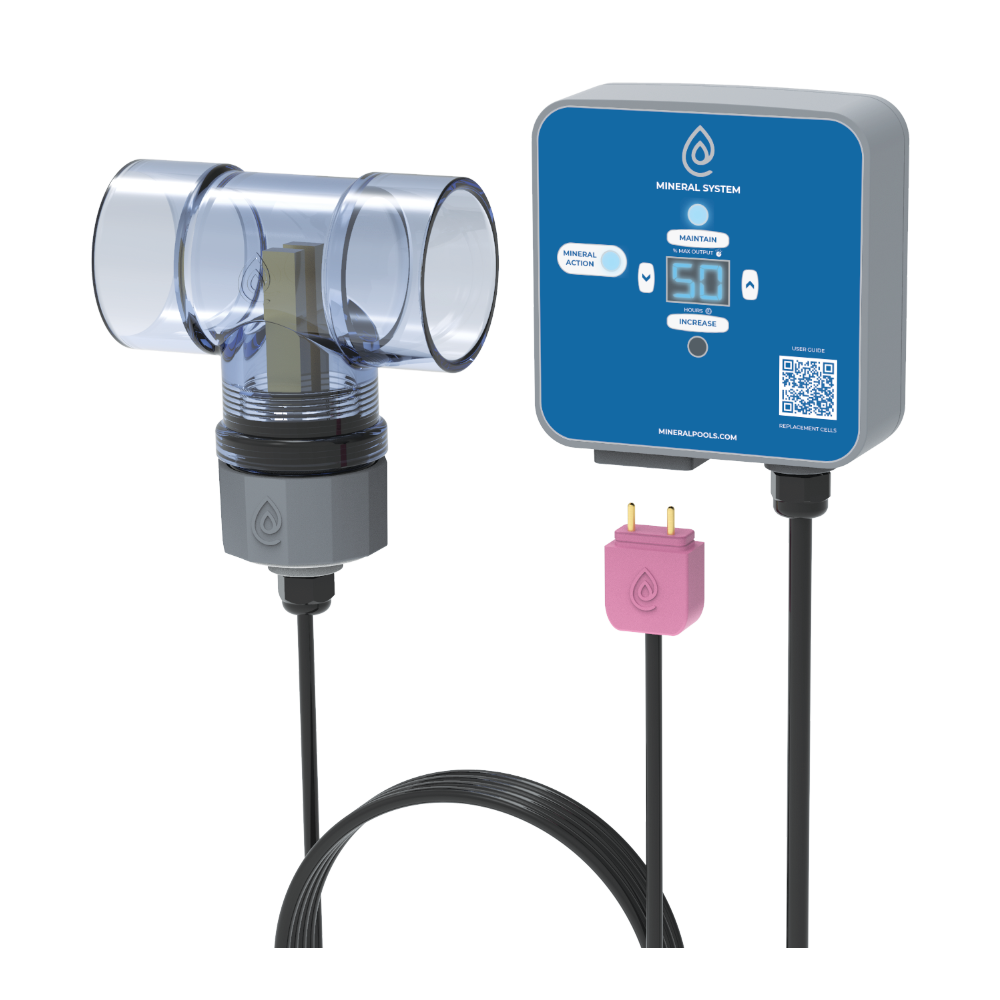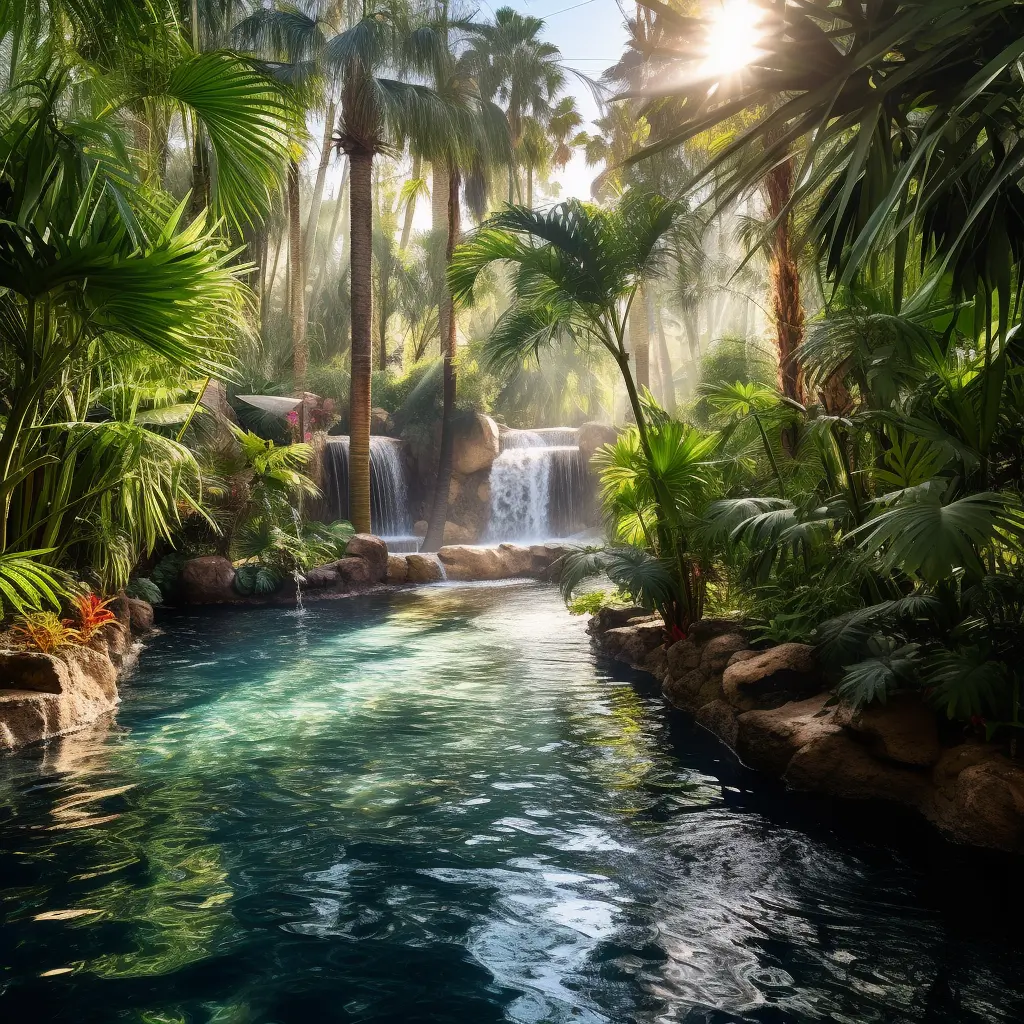There are several systems on the market that will allow you to reduce the chlorine levels in your pool. Two of the most popular are mineral systems and ozone systems. This post compares mineral systems and ionizers vs. ozone for pools.
What does an ozone system do?
Ozone systems hook into your pool filtration system. A manifold assembly routes the water through a special chamber. An electrical device injects the chamber with ozone gas which is a highly reactive form of oxygen. The ozone reacts with particles in the water and ‘oxidizes’ or kills them. This is an effective way to kill water borne pathogens.

What does a mineral system do?
Mineral systems and ionizers also hook into the plumbing. They use a mineral cell to release microscopic mineral ions into the water. Mineral systems use a combination of silver, copper and zinc. Ionizers are similar, but are usually just copper, so they are not as effective.
The mineral ions build up in the water to a level that is toxic to microorganisms, while safe for humans.
Mineral ions are attracted to living organisms in the water and they penetrate the cell walls to kill them. The dead cells clump together and are filtered out by the filter.
This allows you to reduce the chlorine or bromine to drinking water levels while maintaining water that is clean, clear and soft.

What are the benefits ozone for pools?
Ozone is a proven technology that is used for a variety of water treatment applications, including drinking water sanitization. If it’s good enough for drinking water, surely it’s fine for your swimming pool.
Ozone does it’s thing without building up a residual in the water, so there is less risk of throwing off the water chemistry which can lead to problems.
Ozone systems are relatively inexpensive compared to salt systems, UV systems and AOP systems.
Ozone allows you to reduce the chlorine concentration in the pool while maintaining water that is safe to swim in.
What are the benefits of mineral systems for pools?
The biggest battle you face with a backyard swimming pool is fighting algae. And there is nothing more efficient at keeping algae away than ionized minerals. Dollar for dollar, minerals are less expensive for algae control than chlorine and all other sanitizing systems.
Minerals build up a residual in the water so you know it’s always in there and working. Minerals can be tested so you are confident that they are at the appropriate level to work.
When you factor in all costs related to santizing pool water, including chlorine, pH and alkalinity balancing, shocks, algaecide, etc., mineral systems and ionizers provide the most cost effective solution overall for maintaining the water.
Minerals allow you to reduce the chlorine concentration while giving the water unmatched clarity and sparkle.
What are the problems with ozone for pools?
Ozone systems only work when water comes into contact with ozone in the chamber. This means it takes a long time for the entire pool to be treated. You also need to run your pump for it to work which is expensive.
There is no way to test for ozone, so it’s hard to be sure that it’s working. It relies on the homeowner to constantly check the system for errors, which are not always obvious. This can be dangerous because you get used to using less chlorine and if the ozone system fails, it might lead to unsafe water conditions.
Ozone doesn’t completely eliminate the need for chlorine. This means you still have to add some chlorine manually.
What are the problems with mineral systems for pools?
Minerals can build up to higher than recommended levels if the system is not regulated properly or you don’t test regularly.
It’s important to keep the pH, alkalinity and calcium in the standard ranges to make sure that the minerals stay dissolved. Otherwise, they could collect on the water line which can lead to stains over time.
Mineral systems do not eliminate the need for chlorine altogether and do not work with biguanide pools (e.g. Baquacil).
How much does an ozone system cost?
When evaluating mineral systems and ionizers vs ozone for pools, cost is a key consideration. An ozone system made by a reputable company costs over $600 for a pool. The next generation Ozone+UV or AOP systems can cost $3,000 or more.
How much does a mineral system or ionizer cost?
Low budget ionizers start at around $250 and mineral systems start at around $500. You have to replace the mineral cell every 6 months and the cost ranges from $60 for a Chinese knockoff on Amazon to $180 for an EPA registered variety that is tested for purity.
Should I get an ozone system or mineral system?
Generally speaking, the mineral system is less expensive overall, even though you have the ongoing cost of the mineral cells. If you live in a hot climate and your pool is open all year, you will get the maximum benefit from a mineral system or ionizer. The algae fighting properties are well worth the cost and you will have a net savings on chemicals.
Ozone systems are better at breaking down organics like lotions and sunscreens. So if you have a small pool that gets heavy use, ozone might work better.
If you’re looking at mineral systems or ionizers vs. ozone for pools, sometimes the best solution is to use them both together. This way, you get the algae fighting minerals in the water, and the oxidizing properties of the ozone to keep organic material from building up. However, even with both systems, the EPA and Health Canada advise keeping the chlorine level at 0.5ppm and no lower.
Check out the cost and features of the latest mineral system
Compare with the latest pool ionizer
Have a look at a popular ozone system

